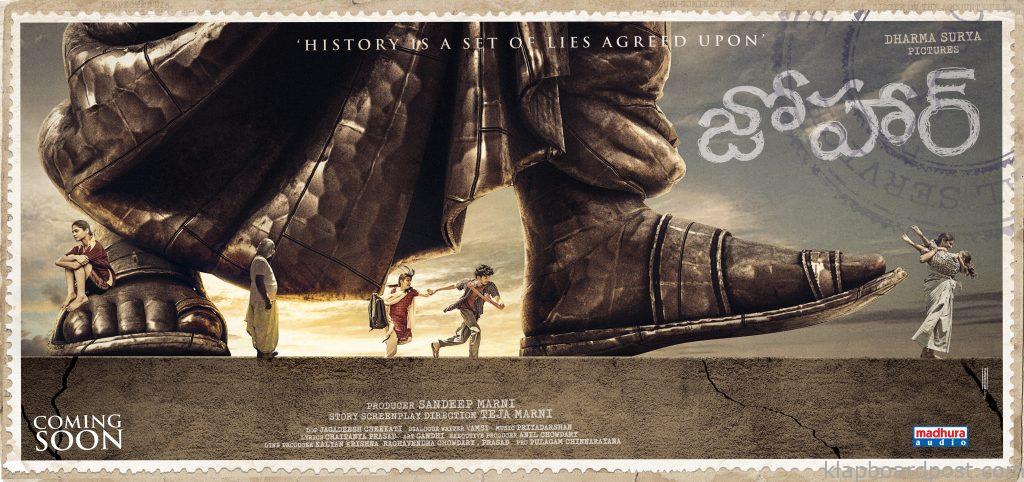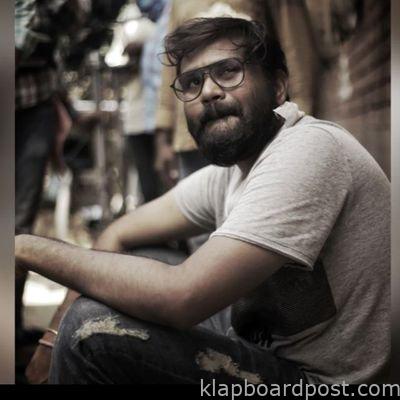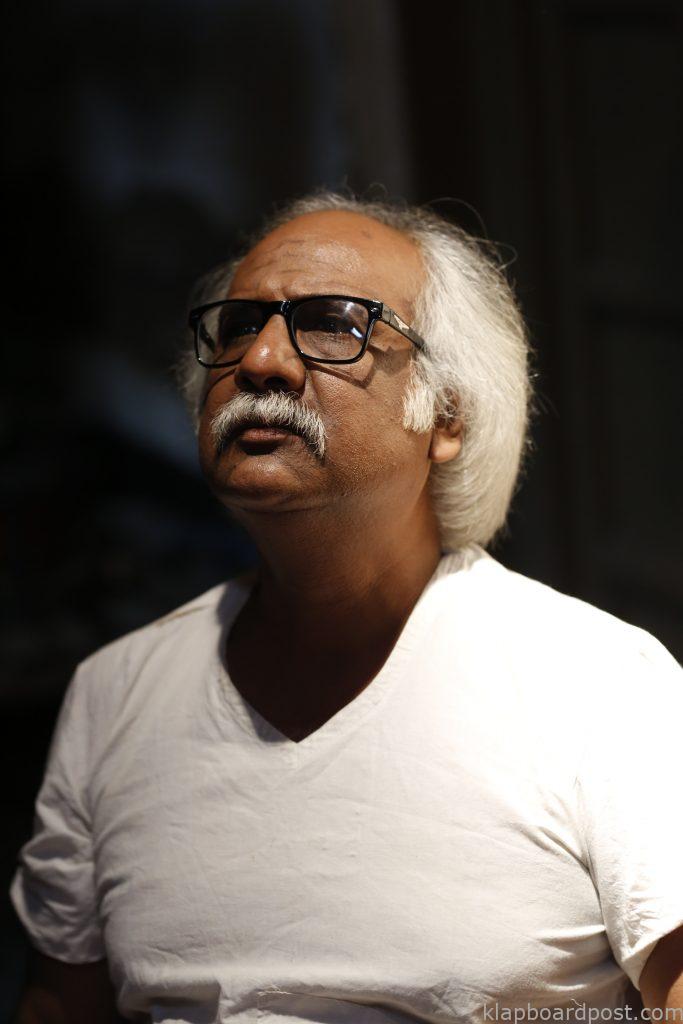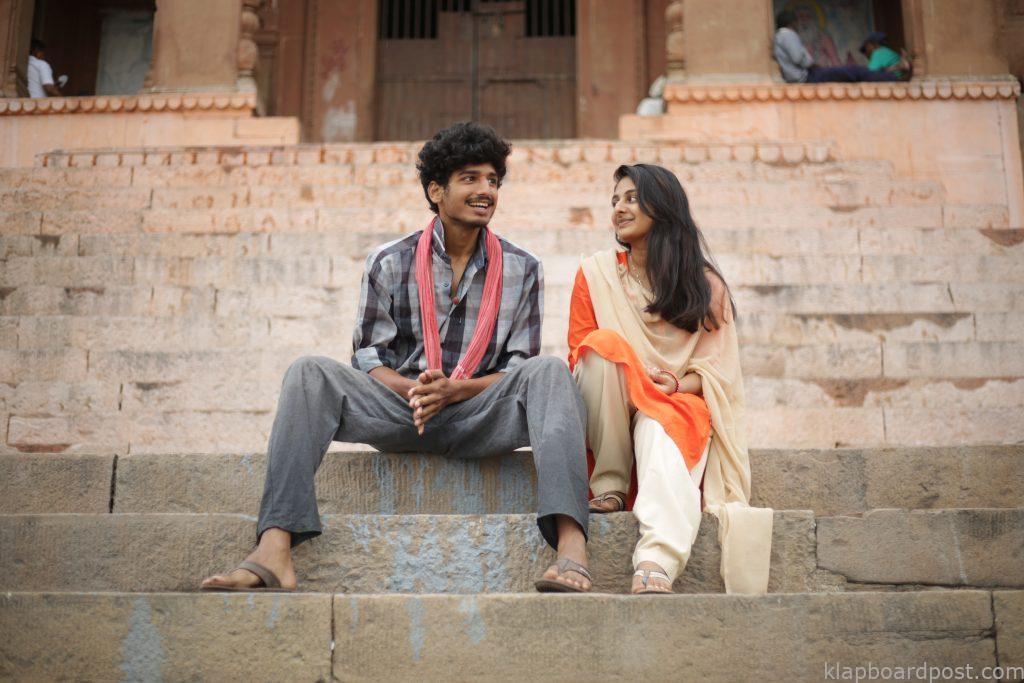Srivathsan Nadadhur
Films are largely a reflection of our society and it’s important for a storyteller to have reasonable worldly experience and ability to understand the society, complexity of relationships before he/she sets out to make their filmmaking debut. Srikakulam boy Teja Marni’s hardships before he aimed for a career in films were integral in helping him shape up Johaar. There haven’t been many political dramas that have showcased the trauma faced by the common man owing to the selfish interests of party-holders on a grass-root level. Johaar takes up the issue of statue politics on this front and has managed to be a fairly engaging film that’s well-intentioned. Teja talks to Klapboardpost.com about the movie that released on Aha the previous weekend.

The last frame in the movie where major characters in the subplots are seen hanging in front of the statue is something I can’t take my mind off…It’s so powerful as a visual element. What went into the imagery?
The visual in the climax is suggestive of the price the politician had to pay for building the statue of his father – the future of five people. He was so shaken to have even unveiled the statue. The statue is built on the foundation of many deaths. It’s a point where he realises that the supposed tribute he wanted to pay his father resulted in human loss. I left it open-ended but for you to know more, you need to wait for me to make the second part!
What triggered you to make Johaar?
The story idea emerged from a recent political development which I wouldn’t want to disclose publicly. Thousands of crores went into the construction of that statue and the timing of the move was very poor; we had so many problems that had to be solved within the country. Any country could have built a bigger statue than this if they really had to and our politicians fail to realise that pride is only temporary. I’m not against the construction of statues in general, but everything has a limit. Regardless of the place where the money for the statue came from, it was an indulgence. The other characters are all people whom I’ve come across and heard of in real life. I thought it would make for a relevant story if one connects those incidents and empathise with those characters.
How did you choose the backdrop of all the subplots – agriculture, philanthropy, education, sports and prostitution and where did the characters emerge?
These are all real characters. I belong to an agricultural family and most of my relatives would lose all the annual crops they had tended to, over a flood. I thought it had to be told in a story for a long time now. I grew up in a village called Uddanam in Srikakulam. It’s a place where many people had kidney ailments because of the groundwater that’s known to have excessive minerals. I regularly saw such people come to the hospital for treatments. Many people who do roadside circus, whom I interacted with, nurse beautiful dreams and I also wanted to imagine the scenario of what if a prostitute’s daughter wishes to become a doctor in the plot. Additionally, chaiwallahs have great ideas to support themselves financially and I used to know many people who studied in the morning and ran a tea stall in the evenings. I found those stories inspiring.

Johaar is not only your first film but one that’s financed by your family. Isn’t that a burden to your creative process?
The financial worries were always there in mind and are still affecting me. My parents have given all the savings they had, for the film. What makes me a happy man at the end of the day is the fact that I could make a good film, it’s a satisfaction not even having crores by your side can give. If I am able to sleep with satisfaction, regardless of the revenue it makes, it’s because of telling a story that mattered. My main motto is to give back every penny I had spent for the movie back to my parents, which I’ve almost done. I wanted to see this project as a stepping stone. Several producers had asked why would people be interested to watch this movie instead of a romance or a comedy? There’ll be an audience for every film, what matters is how honestly you tell the story. I had the conviction to pull it off and I guess, have, managed it. I wanted to keep the financials aside and trust my gut instinct this time. People from another major international streaming platform too had great faith in the content, but the deal couldn’t materialise due to a few reasons.
Your first film didn’t materialise during the scripting stage we hear. And how did you end up making Johaar?
There was a producer who gave me an advance and also offered me a space in his office to take the story forward. I started writing the script and just at the time when I wanted to narrate the story to a leading heroine, the producer came up with names for whom it was convenient to make a film with. I am telling that for the lack of a better word to be uttered in the public. He was interested in everything but the creative process. Such an incident happened with me for my very first film and I couldn’t digest such a reality in the industry. It’s important to separate your personal life from your profession and that’s what the most credible personalities in the industry have taught me. Here was someone who was leaving no stone unturned to make his first film and this was a producer who didn’t seem interested. I immediately quit the project and it took almost six months for me to recover from the shock and bounce back. Many producers didn’t respond to me later and it was during this time that I was trying to re-discover myself and tell a story that I could produce within my resources. Four sub plots were there in my mind and it took another real-life incident to put them together under the same umbrella.
What went into the film’s casting with the newcomers and the few established character actors? Was there any strategy for the market in place?
I trusted the story more than any other factor. The characters in the story had to haunt a viewer’s mind than the actors and we had planned the casting too accordingly. It wouldn’t have been difficult to bring in a known actor for the role that Ankith Koyya ended up playing, but it wouldn’t have brought in the freshness to the characterisation that I desired. My friends got me to see Esther Anil’s Instagram account and I didn’t have second thoughts about casting her. Naina Ganguly, whom I had worked with for Vangaveeti as an assistant director, is a gymnast and had great physical flexibility which made her a natural choice for the role of the athlete.

Even senior actors like Subhalekha Sudhakar or Rohini or Easwari Rao had no inhibitions because they were happy with the characters they were offered and liked my clarity with the subject. Generally, character actors don’t worry if a first-time director would be able to execute it or not, as long as they have a great character. I was suggested to pick actors for their market value, but I didn’t care for it and wanted the performers to have an impact on screen as long as they lasted.
Varanasi was an interesting backdrop for the story of the chaiwallah and academically ambitious girl who happens to be the daughter of a prostitute…
I thought to place God as a witness to everything in that subplot – good or bad. Even a place like Varanasi that one holds with great reverence and is known for its spiritual vibe, has filth around it. One would be surprised to know that such a place is among the top ten regions in the country where prostitution is rampant. It’s a sorry state of affairs and I wouldn’t want to get into that right now. I even thought of a Kolkata backdrop initially but finally were satisfied with the Varanasi setting. It also worked well to show that there’s another dimension to the place that devotees throng in big numbers.

It’s startling to hear the words of the academic in-charge that selling your body is a channel to get your work done in any arena…
I have seen so many students compromise with their dignity with professors, merely for the want of more marks in lab exams or even internals. Education is like a shield today and is viewed as something that guards us at all times and helps us remain strong. The mother of Jyothi (who hears the words of the academic in-charge) always wished to make her daughter a prostitute and a cash cow whom she could benefit out of. Education was the only outlet for the young girl to distance herself from all the filth that surrounded her. She saw it as an avenue where she could stand up on her own feet. However, she’s disgruntled to realise that one needs to sell their body even for academic growth. Making money with flesh trade would have come easy to her but she had left everything to study. The examination incharge thought of taking advantage of her vulnerable situation; but she realises academic pursuit is of little use if one had to tread this notorious path. It establishes the resolve of the character to lead a dignified life.
What did all the hardships involved in Johaar’s making teach you?
‘Ee cinema dwaara jeevitam nercheskunnanu’. My cousins and family members helped me through the making. My parents had given away 25 years of their savings to help their son pursue his dream. My father wanted to build a rice mill for long and he saved all the money for that. I had to live upto the trust, not merely as a son and felt responsible about it. A lot of incidents happened through the film. The shoots were postponed owing to the elections and other miscellaneous factors, delays built a lot of pressure on me. But, on any given day, we wrapped the shoot as per the plan and finished the film in 42 days. I wanted to give hope to the younger generation that once they had good content, they could pull off anything. Not anyone who has watched the film has called it amateurish and the credit goes to my technical team. Nothing will work when you don’t have a solid story to tell.
Tell us how your stint with Vijayendra Prasad helped your cause…
Working with Vijayendra Prasad helped me understand that the story is the heart and soul of every film. More importantly, he told me well about how do we tell it in a way that it captures the imagination of the viewer. No film with a weak story will survive at the box office. I can make Johaar as an arthouse film even today, but wanted to take the mainstream route, came up with terrific songs and background score and gave a contemporary twist to the story.













